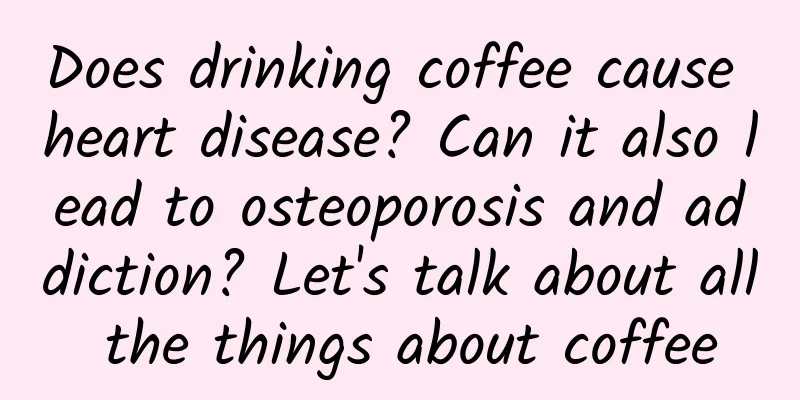Does drinking coffee cause heart disease? Can it also lead to osteoporosis and addiction? Let's talk about all the things about coffee

|
gossip As one of the three most popular beverages in the world, the aroma of coffee makes many people almost obsessed. But some people can't sleep after drinking coffee, and they also experience panic and palpitations. There are rumors that drinking too much coffee is bad for the heart and can induce heart disease . Is this true? Copyrighted stock images, no reproduction is authorized analyze The word coffee comes from Arabic, which means plant beverage. It gradually evolved into a beverage made from roasted and ground coffee beans mixed with water. The reason why coffee is loved by people is probably because it can bring people pleasure and refreshing effects, in addition to its unique taste. Modern nutritional research has found that coffee contains caffeine, tannins, fat, protein, carbohydrates, minerals, and a small amount of lime . It is precisely because of the complexity of these ingredients that different types of coffee have different sweetness, acidity, aroma and cleanliness in taste. Caffeine is the most important active ingredient in coffee and the main source of bitterness in coffee . It is a xanthine alkaloid compound. Moderate intake can stimulate the central nervous system, keep awake, and improve attention and thinking ability. The bitterness of coffee also comes from the taste of caffeine. In 2017, the World Health Organization's International Agency for Research on Cancer included caffeine in the list of Class 3 carcinogens, which means that there is insufficient evidence of carcinogenicity and it may cause cancer, but it is not certain whether it is carcinogenic to humans . In addition, coffee contains a variety of mineral components, such as potassium, magnesium, zinc and chromium , which are also very beneficial to the body's metabolism and various physiological functions. Copyrighted stock images, no reproduction is authorized What are the health benefits of drinking coffee? ▶ First, it can refresh the mind and relieve fatigue . The structure of caffeine in coffee is similar to adenosine. It will competitively bind to the sleep-promoting neuron receptors, thereby inhibiting brain drowsiness and fatigue. ▶ Second, protect cardiovascular and cerebrovascular systems and reduce the risk of accidents . A study at the 2021 European Cardiology Congress showed that drinking moderate amounts of coffee (0.5-3 cups) a day can reduce the risk of death from cardiovascular disease by 17% and the risk of stroke by 21%, which may be related to the caffeine and tannins in coffee. ▶ Third, it helps digestion and promotes defecation . The acidic substances in coffee can promote the production of gastric, bile and pancreatic secretions, help gastrointestinal motility, and relieve indigestion. Caffeine can also promote the secretion of gastrin, which in turn increases the secretion of gastric acid. Studies have found that drinking low-caffeine coffee can increase gastrin levels by 1.7 times compared to not drinking coffee, while drinking high-caffeine coffee can increase gastrin levels by 2.3 times. In addition, studies have also found that coffee can stimulate distal colon motility and enhance defecation reactions, thereby relieving constipation. Its effect is similar to that of grains and is more than 60% stronger than drinking water. ▶ Fourth, it can help relieve edema by promoting diuresis . The caffeine in coffee can enhance kidney function, increase urine output, and promote the excretion of sodium ions in the body, thereby relieving edema. In addition, related studies have also found that drinking coffee in moderation can prevent the occurrence of gallstones, protect the liver, improve intestinal flora, improve skin condition, inhibit fat synthesis in the body, and reduce the risk of chronic diseases such as type 2 diabetes, depression and suicide. However, these need further verification. However, when drinking coffee, you should also pay attention to factors such as sugar and creamer that may affect your health . Both white sugar and brown sugar are pure energy foods. If consumed in large quantities for a long time, they will not only increase the risk of metabolic syndrome such as obesity and diabetes, but may also accelerate skin aging. Creamer and sugar contained in instant coffee also have the above problems. Copyrighted stock images, no reproduction is authorized The health effects of coffee are all based on moderate drinking. How much is considered moderate drinking ? This mainly depends on the amount of caffeine in the coffee. Generally speaking, if a normal person consumes more than 400 mg of caffeine at a time, the risk of discomfort symptoms increases significantly, so it is recommended that the amount of caffeine consumed per day should be less than 400 mg . For example, a portion of instant coffee contains 50-70 mg of caffeine, so it is not advisable to consume more than 6 portions per day. A cup of hand-brewed coffee contains about 100 mg of caffeine, so it is more appropriate to drink 3-5 cups a day. In addition, the amount of coffee you drink every day is also related to factors such as weight and coffee type. If you are underweight, it is recommended that you reduce your drinking amount accordingly. If the coffee you drink is espresso, you should also reduce your drinking amount accordingly. In addition to coffee, many beverages in life also contain caffeine, such as cola, tea, milk tea, etc. If you drink these beverages, remember to reduce the amount of coffee you drink. My heart rate increases after drinking coffee. Is this a sign of heart disease ? An increased heart rate after drinking coffee is not a disease state, but it still needs to be taken seriously . The caffeine in coffee increases the excitability of the central nervous system, causing the heart rate to increase significantly, the myocardial contractility to increase, the blood vessels to dilate, the blood flow to increase, and the respiratory rate and gastrointestinal motility to increase. The strength of these effects is related to the body's tolerance to coffee and the concentration of coffee . For example, people who are used to drinking coffee may not feel anything at all, but people who are intolerant to caffeine will feel panic, palpitations, dizziness and discomfort. Moreover, the higher the concentration of coffee, the more obvious the symptoms will be. Copyrighted stock images, no reproduction is authorized So if you drink too much coffee, will it really cause heart disease ? Drinking coffee in moderation will not increase the risk of cardiovascular and cerebrovascular diseases, but long-term excessive drinking may increase the risk of cardiovascular diseases . A study by the University of Sao Paulo in Brazil found that the risk of atherosclerosis was 63% lower when drinking 3 cups of coffee a day than when drinking less than 1 cup or more than 3 cups. Related studies in the United States also believe that the mineral components contained in coffee have a certain protective effect on cardiovascular health. There is also a view that for those who have already suffered from coronary heart disease or even myocardial infarction, drinking coffee in moderation will not affect their heart function or aggravate their symptoms. However, if you drink excessive amounts of coffee for a long time, it may be another matter. On the one hand, large amounts of caffeine intake will increase the burden on the heart and induce cardiovascular disease . Studies have found that drinking more than 6 cups of coffee a day may increase the risk of high blood pressure, heart disease and stroke. The reason is that high doses of caffeine will significantly increase heart rate and blood pressure, put pressure on the cardiovascular system, and increase the risk of arrhythmia or irregular heartbeat. Increasing the heart rate is equivalent to increasing myocardial oxygen consumption, and arrhythmia will aggravate the problem of insufficient blood supply to the heart, all of which will increase the risk of coronary heart disease, myocardial infarction and other diseases. On the other hand, excessive coffee intake can also narrow blood vessels, leading to insufficient blood supply to organs . The acidic substances and caffeine in coffee have the effect of constricting blood vessels, which can lead to reduced blood flow to major organs of the body, ischemia and hypoxia, and increase the risk of heart attack and stroke. Copyrighted stock images, no reproduction is authorized In addition, excessive coffee consumption increases the risk of hardening of blood vessels and atherosclerosis . Some studies have shown that caffeine causes blood vessels to constrict and harden at the same time. Taking the aorta as an example, when consuming 200 mg of caffeine, the pulse wave velocity increases and the enhancement index increases by 4%. This effect is significantly enhanced as the amount of caffeine increases. If you smoke at the same time, this effect is further enhanced. In addition, some compounds in coffee can induce inflammatory responses in the body and increase the risk of atherosclerosis. Does drinking coffee cause osteoporosis ? Drinking coffee is only a risk factor for osteoporosis, not a pathogenic factor. Drinking coffee in moderation will not lead to osteoporosis . In fact, ingredients such as caffeine and oxalic acid in coffee do affect calcium absorption and increase calcium loss, but the extent of the impact is very limited. There is a dynamic balance in calcium metabolism in our body. When the amount of calcium excreted through urine and other channels increases, the loss will be compensated by increasing the absorption rate of calcium in the intestine. Therefore, as long as the diet is balanced, drinking coffee in moderation will not cause calcium deficiency . Is coffee really addictive? Coffee is indeed addictive, but quitting it will not have a lasting impact on the body and mind . Drinking coffee regularly will make the body slightly dependent on caffeine. The reason is that caffeine not only stimulates the brain to produce a mild sense of euphoria, but also binds to the adenosine receptors in the brain, making the activity of neurons "undecayed", making people feel relieved from fatigue. Studies have found that when you consume more than 100 mg of caffeine a day, you will develop physical dependence. If you stop consuming caffeine for 12-24 hours, you will experience headaches, fatigue, anxiety, and difficulty concentrating, and you will want to drink a cup of coffee immediately. This situation is also called "caffeine withdrawal." However, this reaction is not the same as the persistent reaction caused by withdrawal from drugs and psychotropic drugs. Most people can recover within 2-3 days. Who is not suitable for drinking coffee? Although drinking coffee can bring physical and mental pleasure, it is not suitable for everyone. Coffee is not recommended for children and adolescents who are in an important period of physical and neurological development, people who are sensitive to caffeine, people with long-term insomnia, people with gastrointestinal diseases and osteoporosis . Coffee can also affect the absorption of iron in food, and it is not recommended for people with iron deficiency anemia . Pregnant women should also be cautious when drinking coffee , and it is recommended not to exceed 1 cup a day. Coffee should not be taken with ephedrine cold medicines , as symptoms of "overdose" will occur. Copyrighted stock images, no reproduction is authorized In addition, for those who often stay up late and work overtime, it is unrealistic to try to "extend life" by drinking coffee . Coffee can only provide a short-term brain excitement. Increasing the amount of coffee will not only cause dependence on caffeine, but also aggravate mental anxiety and insomnia. Instead of fishing in the pond, it is better to take a long-term view and give the brain and body enough rest. in conclusion In short, coffee is a healthy drink, and drinking it in moderation is good for your health. The saying that drinking too much coffee is bad for your heart and can induce heart disease is not entirely accurate. The key is to control the amount. You can make reasonable choices based on your personal situation in life . Author: Zhang Yu: Deputy Director and Researcher, Office of Nutrition and Health, Chinese Center for Disease Control and Prevention Reviewer: Zhang Na, Associate Researcher, Doctoral Supervisor, Peking University School of Public Health Planning丨Zhong Yanping Editor: Li Xin Layout by Li Mengxin The article is produced by "Science Refutes Facts" (ID: Science_Facts). Please indicate the source when reprinting. The cover image and images within this article are from the copyright gallery. Reprinting and quoting them may lead to copyright disputes. |
<<: Doctors can also make mistakes?! Do you really understand "evidence-based medicine"?
>>: What is it like to have a good figure? Let's meet this "water bird model"
Recommend
How much does it cost to customize the Zaozhuang coupon mini program? Zaozhuang coupon applet customized price inquiry
How much does it cost to customize the Zaozhuang ...
Google's "AI Guess the Picture" app is popular on WeChat Moments: user participation makes it smarter
One day after its launch, Google's first WeCh...
This kind of food that you think is very "dirty" is actually rich in nutrients
Duck blood is a very common food ingredient, smoo...
Can't you learn Durex? Because you don't understand these 6 marketing ideas...
poet? Joke teller? Emotional expert? A veteran in...
Welcome Laba Festival, have you had porridge today?
China Science and Technology News, December 30 (X...
How to tell whether your mobile phone screen is good or bad? Teach you how to understand screen parameters
This article explains in detail what these six pa...
14-day labor dispatch finance and taxation advanced training camp
Resource introduction of the 14-day labor dispatch...
Can stickers not only cure emo but also help lose weight?
Have you posted today? When Tadpole is working ov...
Humans cannot marry close relatives, but what about animals?
I recently saw an interesting content: "Why ...
Extraordinary Journey | Shenzhou 10, ten years of asking the sky!
Ten years ago today, the Shenzhou-10 spacecraft c...
15-year-old "weight-loss girl" dies, weighing only 24.8 kg! Family members are heartbroken!
Today, "the girl who lost weight for love pa...
How to quickly reconstruct the operational strategy of private domain e-commerce?
Recently, I have been busy communicating with dif...
Have you ever thought of a possibility that your bites are not caused by mosquitoes?
Mosquitoes in the summer are so annoying! They bu...
How to make your Tik Tok VLOG become popular content?
Tik Tok is a short video software used by many yo...
Drinking a bottle of Huoxiang Zhengqi water when you have a heat stroke? Nonsense, this is a suicidal act!
We all know how hot the weather has been recently...









